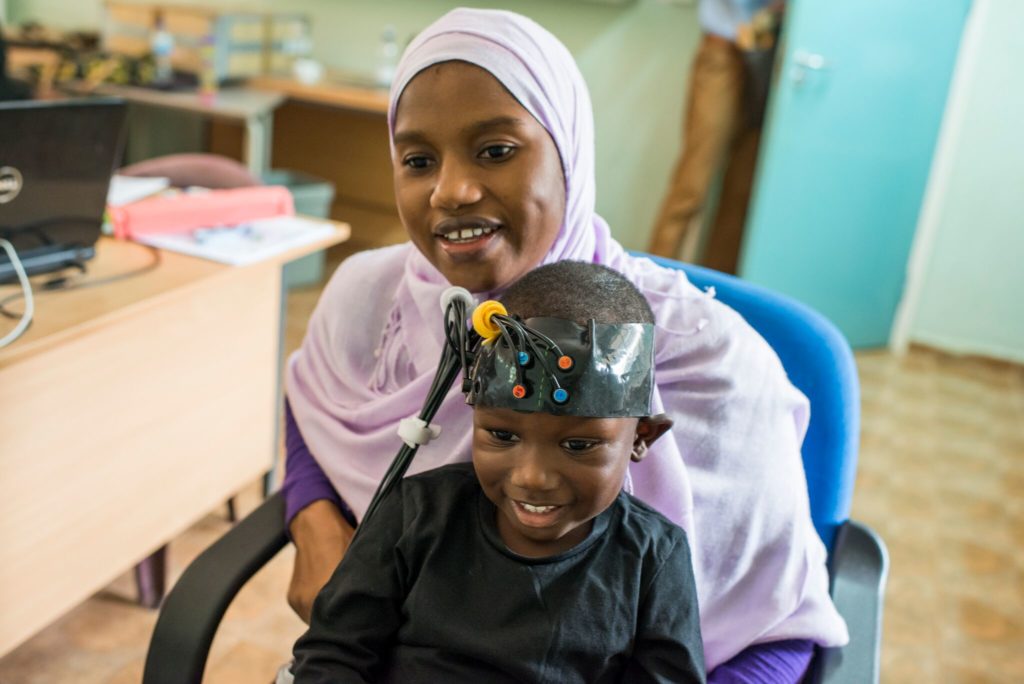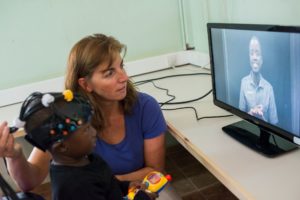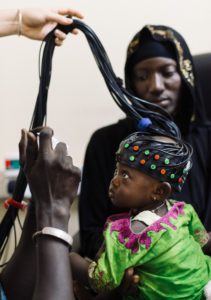Since recording the first brain images of babies in Africa, Professor Clare Elwell, part of the Brain Imaging for Global HealTH (BRIGHT) network, of which Birkbeck is a member, has been leading a pioneering study to increase our understanding of early brain development. Clare discusses bringing a new imaging technology to a remote Gambian village, and how it could help babies suffering from malnutrition to reach their full potential.

Image credit Bill and Melinda Gates Foundation
Before they reach five years of age, one in four children across the globe are malnourished. There’s a lot of research showing the detrimental impact this has on their development. But we know very little about what’s going on inside their brains.
Conventional brain imaging techniques, like magnetic resonance imaging (MRI), require large, bulky and expensive scanners. Unfortunately, this technology is not available in resource-poor settings, often where malnutrition is most prevalent, and is not always suitable for very young babies.

Clare Elwell with an infant taking part in the BRIGHT study: Image credit Bill and Melinda Gates Foundation
The BRIGHT families
We’re recruiting the mothers before the babies are born, because some of our measures start within the first few days of the infants’ lives. It’s a huge commitment. We’re extremely grateful to all the families in our study, both in the UK and in The Gambia.
For some mothers this is their first baby; they have no idea what’s ahead of them, and yet they’ve agreed to enrol into a study where we’re going to be part of their lives for at least two years. It’s really thrilling to see how motivated and how dedicated they are to this project.
Hopes for the future
I think the BRIGHT study is a good example of where a solution had existed for a long time, but we just didn’t know about the problem. Once I realised that understanding infant brain development in Africa was a challenge, it’s been incredibly rewarding to bring in existing technology to help.

Infant with fNIRS imaging headset in Keneba: Image credit Ian Farrell
We’d like to continue to follow our cohort and to study them in the pre-school years, so that we have a continuous measure of their brain function. I’d also really like to see the MRC field station at Keneba become a centre of excellence for infant brain development studies. Capacity building has been a large part of our project and we have been training many local field staff to conduct a whole range of infant brain development assessments. This will help us use all the skills and the talent that’s already in Africa to learn how we can optimise the methods we are using; to better understand brain development in this population; and ultimately, to ensure that all infants reach their potential in leading happy and healthy lives.
The BRIGHT study is a collaborative project, made up of a team of researchers from UCL, Birkbeck University of London, the Medical Research Council Units in Cambridge and The Gambia at London School of Hygiene and Tropical Medicine, Cambridge University and Cambridge University Hospitals.
The project is part of the Global fNIRS initiative for the use of fNIRS in global health projects. This blog was first published by the Medical Research Council, and is reposted with their permission.
